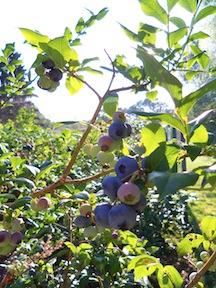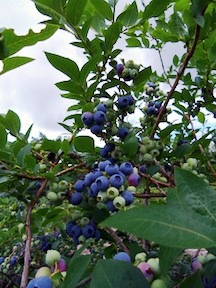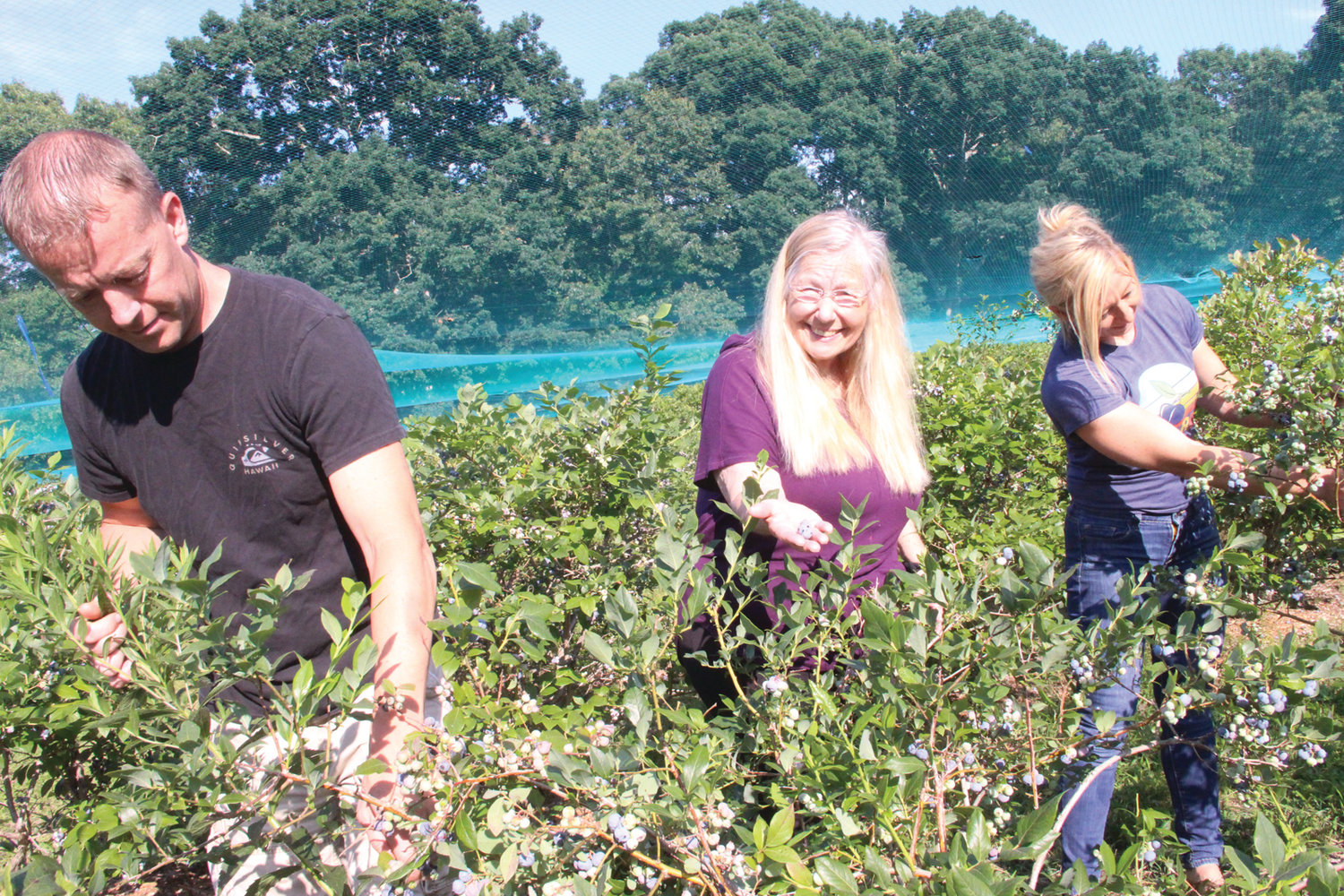About Us
A dream come true for new owners of Rocky Point Blueberry Farm
Nancy Cornish knows opportunity can knock twice.
When she learned last fall that the Rocky Point Blueberry Farm was for sale, she didn’t waste a moment to get in her bid to buy it.
She was all smiles last Monday afternoon following the first day of blueberry picking since she, her son Stephen and daughter-in-law Sonya took over operations of the 8.5-acre property and home on Warwick Neck. It was nonstop at the farm with more than 160 sales from 7 a.m. to noon, when the farm closes because by that time it’s just too hot.
It couldn’t be better. It was sunny. The berries are ripe, some almost as big around as quarters, and in this day of COVID-19 requirements here was an activity that had everyone properly distanced and enjoying the fruits of the season.
“They were happy people, happy to be outside,” Sonya said.
The story of how Nancy bought the berry farm that Mark and Betty Garrison started in the mid-1980s goes back to 2012 when the Garrisons sold the property, preserving it as woodlands and for agricultural uses through the sale of an easement to the Department of Environmental Management, and moved to Edgewood. Nancy knew the Garrisons and remembers bringing Stephen to pick berries as a child. Nancy and her children had been traveling from Kansas to visit grandparents every summer. The first time Stephen came to Warwick Neck was when he was only 6 weeks old.
When she learned the Garrisons would be selling [requirements of the easement follow the property], Stephen and Sonya went with her to see the property as they were visiting between being stationed in Virginia and changing duty stations to Okinawa. They all loved it right away. Nancy rushed to submit an offer only to be thwarted by a temperamental computer printer. The following day, when she finally had a document, she hand-delivered it to the Garrisons only to discover the night before they had signed a sales agreement with Rhonda Shumaker and her husband, Joe Gouveia.
Nancy, Stephen and Sonya were crushed. They believed they had missed the opportunity of a lifetime, but in retrospect things worked out for the best.
“I think God is wise. He knew ‘not now,’” she said from the living room of the house that will become her son’s home once he completes 24 years of service with the Marine Corps in 2021. Stephen was on leave this week but returns to Okinawa next week where he has been focused on jungle warfare.
“I was looking for something to do after retirement,” he quips.
All three have already had a good taste of what being a blueberry farmer is all about. In February, Nancy was out with the clippers pruning the bushes and following the directions Rhoda and Joe laid out for her and they had acquired from Mark and Betty. There is a lot of work to managing more than 2,000 blueberry bushes covering two and ½ acres.
In the spring when the bushes flower they bring in 16,000 bumble bees – Nancy has the number on the tip of her tongue – to pollinate the berries. Then as the berries develop they hang the netting to protect them from the birds and all the critters that would eat them. That doesn’t stop the deer that punch head-sized holes in the netting for a treat, the squirrels that gnaw holes and the rabbits that burrow under the netting. The local birds know how to get in and out, too.
Nancy doesn’t fret over the rabbits since they’ll eat the berries that have fallen to the ground. Then there’s the job of tending the operation once the picking starts. Using Facebook to get out the word, Stephen recruited 12 youths to pick so as have berries for those who don’t want to pick their own. In this time of COVID, they set up a station for hand washing and arranged to systematically disinfect the counter.
Thinking back eight years when the Garrisons sold the farm, Nancy says she never would have been able to handle it by herself. As it turned out, she left a job she loved as a college music professor in Cheyenne, Wyoming, to return to Warwick and spend the next eight years caring for her aging parents who lived to almost 107 and almost 102. There was no way she would put either of them in a nursing home. Caring for her parents full-time was something she couldn’t have done while also running a farm. Now she has the time and Stephen and Sonya are here to help.
Nancy considers the farm a sacred place, “a Christmas present from God”. When Rhonda and Joe put the farm up for sale this time, Nancy learned of it on Christmas Day 2019.
“Opportunity rings knocks twice,” she says with a smile. Finding herself one of four looking to buy the property, she didn’t haggle over the asking price of $712,000 and, in fact, boosted it to $720,000. “I wasn’t going to lose it this time,” she said.
Joe and Rhonda asked the four bidders to write a letter about why they wanted the farm. Nancy wrote of their dream to own the farm, how they missed the bid by one day eight years before, and how important it was for Stephen to find community and a home and a peaceful place to work after having served 15 deployments with the Marines. Nancy thinks her letter helped her win the bid.
Then there was the matter of raising the money that required selling her house. She and Stephen are equal owners of the farm.
The blueberry picking runs through August when the family will get a brief break before harvesting pawpaws, the juicy fruit produced from a stand of about 36 trees on the property. With the proper controls, Sonya is hopeful of bringing back the pumpkin walk on Halloween.
For the moment, Nancy soaks in all that has happened – the bounty of blueberries ready to be picked; the house with a glimpse of the bay through the trees; the gurgling pump-fed stream and its ponds just outside the porch; the discovery of 2 peach trees they didn’t know were on the property and the bringing together of family.
“Every day I go out and listen,” she says standing on the porch. “I think God is blessing me greatly.”
Varieties
Are all blueberries the same? Our blueberries are the cultivated highbush type, not the lowbush type harvested in Maine nor the wild highbush berries some of our customers picked as children. We have six varieties of blueberries, plus several more that we are testing. Each row in the patch is marked so you can know the variety you are picking if you wish.


Which are the sweetest? Which are the best tasting? The simple answer to the question about sweetness is that each of our varieties is sweet if the berry is fully ripe. But there are differences. For example, one of our varieties–Berkeley–is less tart when not 100% ripe than the others, and when ripe its taste is milder. At the other extreme, Herbert is quite tart right up to the moment of ripeness, but when ripe has a complex and delicious flavor that makes it our favorite for fresh eating when we can take the time to pick carefully for ripeness. A sure-fire way to determine ripeness is to look for a dark circle where the stem hits the berry (on Herbert, there is a noticeable swelling at that point when the berry is fully ripe). Some varieties ripen earlier than others; usually Blue Ray and Nui are the earliest, closely followed by Blue Crop then Berkeley. Nelson and Herbert are our latest ripening varieties.
How do I find a variety? Each row is marked along the main path with the name of the variety.

